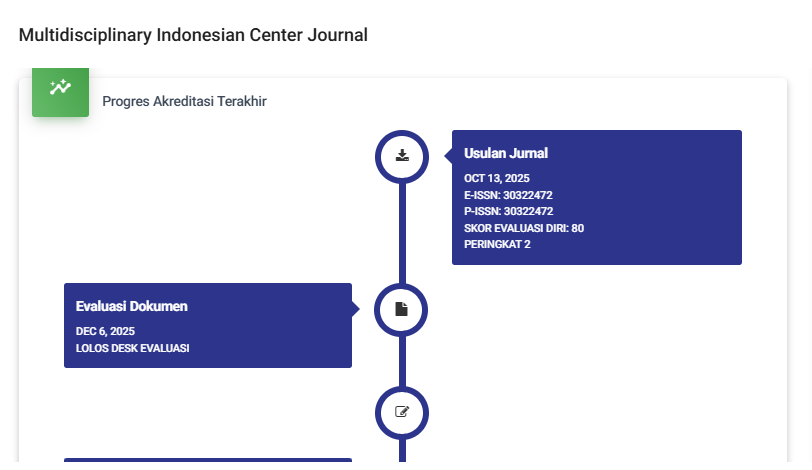A VALUE-ADDED ANALYSIS OF THE PEMPEK BUSINESS IN TENGGARONG, INDONESIA
DOI:
https://doi.org/10.62567/micjo.v2i3.573Keywords:
Added Value, Pempek, Hayami model, IndonesiaAbstract
The processing of fisheries products, characterized by the diversification of processed goods, presents a promising avenue for entrepreneurial endeavors. Product diversification holds the potential to augment the intrinsic value of products and concurrently elevate public consumption of fisheries-related commodities. This research aims to analyze the prospective added value stemming from the pempek businesses in Melayu Sub-District, Tenggarong, Kutai Kertanegara. The acquired data underwent meticulous processing, tabulation, and subsequent analytical examination, characterized by both descriptive and value-added analyses, utilizing the Hayami model. The research showed that the managed pempek businesses are predominantly of small scale, utilizing relatively simple technology. On average, a single production cycle yields 126.64 kg, or monthly output of 633.2 kg. The value-added analysis reveals a figure of 186,734 IDR per kg, with a commendable value-added ratio of 70.95%. This signifies that the conversion of belida fish into pempek not only imparts substantial value but also presents a highly promising avenue for further expansion and development.
Downloads
References
Aji, V. P., Yudhistira, R., & Sutopo, E. (2018). Value-added analysis of Lemuru fish processing using the Hayami method. Industrial Engineering Scientific Journal Vol. 17 No. 1 pp: 56-61
Alhanannasir, A., Rejo, A., Saputra, D., & Priyanto, G. (2018). Characteristics of cooking time and color of instant pempek using freeze-drying method” Agrotechnology Journal Vol. 12 No. 02 pp: 158-166
Anova, I. T., & Kamsina, K. (2012). Effect of Substitution of Tapioca Flour with Various Types of Flour on the Quality of Mpek-Mpek Palembang Food. Jurnal Litbang Industri Vol. 2 No. 1 pp: 27-33
Awami, S. N., Nurjayanti, E. D., & Subekti, E. (2019). Value-added analysis of Smoked Manyung Fish Processing Business in Demak Regency. Jurnal Agrica Vol. 12 No. 2 pp: 50-60
Caruntu, C., & Lapadusi, M.L. (2012). Methods used in determining the value added used in the assessment of the company’s real economic power. Annals of the University of Petrosani Economics Vol. 12 No. 1 pp: 33 – 48
Central Statistics Agency. (2022), Kutai Kartanegara Regency in Figures 2022
Febriyanti, A. M., & Kalsum, U. (2017). Financial analysis and value-added of banana chips agroindustry at UMK scale in Metro City. JIIA Vol. 5 No. 1 pp: 48-56
Hayami, Y., Kawagoe, T., Morooka, Y., & Siregar, M. (1987). Agriculture marketing and processing in upland Java, A Perspective from a sunda village. CGPRT No. 8 Bogor: CGPRT Center
Hasni, D., Yusriana, & Auliaddin. (2022). Value-added analysis in the arabica coffee product supply chain using the Hayami method (a case study in Central Aceh Regency). Agrointek Vol. 16 No. 4 pp: 553–565.
Herawati, V. E., Saraswati, L. D., & Juniarto, A. Z. (2020). Strengthening the leading commodity of the community through processed fish product diversification in Asinan Village, Bawen Subdistrict, Semarang Regency. Pasopati Journal: Community Service and Technology Development Innovation, Vol. 2 No. 4
Hidayat, S., Marimin, Suryani, A., Sukardi, & Yani, M. (2012). Modification of Hayami’s value added method for the palm oil agroindustry supply chain. Jurnal Teknologi Industri Vol. 22 No. 1 pp: 22–31
Hutauruk, J., Tarigan, K., Siahaan, S. D., Sitohang, M., Zalukhu, L., & Sihombing, D. R. (2018),. Hayami method application in the evaluation process of farmers who produce wet and dry corn seed. IOP Conference Series: Earth and Environmental Science Vol 205, 012009
Imani I. (2016). Profit analysis and value-added of Cassava (Manihot Esculenta) processing into tela-tela in Mandonga District, Kendari City. [Thesis, Agribusiness Study Program, Faculty of Agriculture, Halu Oleo University, Kendari)
Istiani, S. A., & Soetriono. (2022). Analysis of value added on milk processed in Rumah Susu Business: Hayami method approach. Journal of social and Agricultural economics Vol. 15 No. 1 pp: 97 – 112
Karneta, R., Rejo, A., Priyanto, G., & Pambayun, R. (2013). Changes in nutritional value of pempek lenjer during boiling. Applied Research and Policy Publication Vol. 7 No. 2
Melayu Sub-district. (2022), “Melayu Sub-district Profile 2021”
Mujiburrahmad, Marsudi, E., & Usman, M. (2019). Value-added analysis of Wet and Dry Packaged Nutmeg Processing in Tapak Tuan District, South Aceh Regency. Tani Business Journal, Teuku Umar University Vol. 5 No. 1 pp: 14-25
Murtado, A. D. (2016). Pempek flour as a product development ingredient for pempek. Research Report pp: 27-32.
Nurlina, N. (2018). Analysis of the interrelation between the fisheries sub-sector and other sectors in the economy of Aceh Province. Samudra Ekonomika Journal Vol. 2 No.1 pp: 20-29
Prameswari, G. N. (2018). Nutritional promotion influencing children's liking for eating fish in school. Journal of Health Education Vol. 3 No. 1 pp: 1-6
Riana. (2006). Development of Fast Food Pempek Base Processing Technology and Financial Analysis of the Business. (Thesis, Postgraduate Program, Sriwijaya University, Palembang)
Rizqiah, F., & Setiawan, A. (2014). Value-added analysis and determination of performance measurement metrics in the papaya calina supply chain (a case study at PT Sewu Segar Nusantara). Management and Organization Journal Vol. 1 pp: 72 – 89
Subhan, H.A. (2014). Income analysis and value-added of Seaweed Dodol in the Cinta Rasa Industry in Tinggede Village, Sigi Regency. Agrotekbis Vol. 2 No. 5 pp: 495 - 499
Suryaningrum, T. D., & Muljanah, I. (2009). Prospects of Palembang Pempek Processing Business Development. Squalen Bulletin of Marine and Fisheries Postharvest and Biotechnology Vol. 4 No. 1 pp: 31-40
Sunarno, M. T. D. (2002). Save the genetic resources of belida fish. Warta Penelitian Perikanan Indonesia Vol. 8 No. 4 pp: 2-6
Uyunun, U., Yuliana, E., & Nurilmala, M. (2020). Prospective Study of Fish Floss Business (Case: CV Aroma Food, Banda Aceh City). PELAGICUS Vol. 1 No. 3 pp: 123-134
Wibowo, A. R. I. F. (2011). Bioecological Study to Determine the Management Direction of Belida Fish (Chitala Lopis Bleeker 1851) in Kampar River, Riau Province. (Thesis. IPB University)
Downloads
Published
How to Cite
Issue
Section
License
Copyright (c) 2025 Gusti Haqiqiansyah, Juliani, Said Abdusysyahid, Muhammad Syafril, Nurul Ovia Oktawati, Etik Sulistiowati Ningsih, Erwan Sulistianto

This work is licensed under a Creative Commons Attribution-ShareAlike 4.0 International License.



























